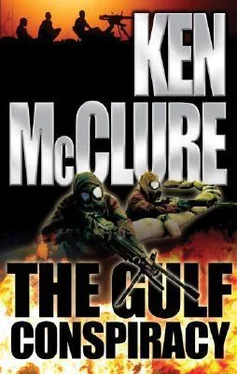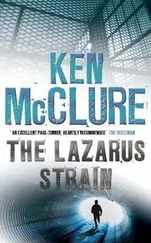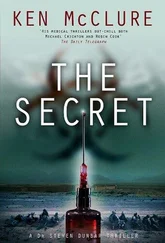‘We’ve just been assured that there will be no lasting effects from this damned thing,’ snapped Gardiner, bristling at the remark.
‘I sincerely hope and believe that to be the case,’ said Crowe, realising with some obvious concern that he was the source of assurance Gardiner was referring to. ‘Of course, there’s no way of being absolutely sure...’
Downing Street
London
February 1997
‘It is almost six years since the Gulf War ended,’ declared the Prime Minister with an obvious sense of frustration. ‘And yet Gulf War Syndrome is still an issue. Why hasn’t this matter been resolved long ago?’
‘With respect, Prime Minister,’ replied one of those present from the Department of Health, ‘It’s a much more complicated than it seems. It has of course, been the government’s position all along that no such syndrome exists — a decision only taken after extensive consultation with the medical authorities, I have to say — and yet the number of people claiming that there is and seeking recompense keeps on growing.’
‘What numbers are we dealing with here?’ asked the PM.
‘Estimates put the figure at approximately fifteen percent of the returning allied forces having complained of health problems, which they ascribe to having taken part in the conflict,' said the DOH man.
‘And in real numbers?’
‘Something in the order of quarter of a million, Prime Minister.’
‘I take it we are talking in terms of all the allied forces?’
‘Yes sir.’
‘And deaths?’
‘Ten, perhaps as many as twelve thousand.’
There was a long silence before the PM said softly, ‘That many?’
‘With respect, Prime Minister,’ said the Defence Minister, ‘Hysteria has played no small part in inflating these figures. Any tommy sniffing a hint of compensation has been turning up at his GP looking for a ticket to easy street.’
‘And the dead? Are they malingering too?’
‘As you yourself pointed out, it has been six years since the war. A lot of things can happen in six years to all of us and people do tend to die for a whole variety of reasons. It has always been quite clear that the huge range of symptoms appearing on medical reports must preclude any one single cause as being responsible for illness among veterans.’
‘And yet the veterans seem more adamant than ever,’ said the PM. ‘I’ve been looking through submissions from their various associations and they have become an organised and articulate lobby.’
‘The facts remain the same,’ insisted the Defence Minister.
‘I need hardly remind you that we are only months away from an election,’ said the PM. ‘Put bluntly, on top of everything else, we cannot afford to be seen fighting the sick.’
‘Would the Treasury consider softening its attitude on compensation perhaps?’ suggested a man from the policy unit.
The Department of Health man shook his head and said, ‘Apart from the sheer numbers involved, we would need some method of appraising the condition, some guidelines as to how we decide whether or not symptoms could be ascribed to the war. You don’t need to be clairvoyant to see that this would be an enormous stumbling block which would in turn lead to a sense of injustice in those denied and the consequent setting up of appeals panels and so on and so forth. It has all the makings of a bureaucratic nightmare, if I may say so.’
‘Of course it has. It’s an absolute non-starter,’ said the Defence Minister. ‘Frankly, I don’t think the Press will be too hard on us over this issue simply because of the enormous range of illnesses. Even a fool can see that they can’t all be right.’
‘So you would suggest that we do nothing and ride out the storm, should it come to it?’ asked the PM.
‘I honestly don’t think that it will,’ said the Defence Minister. ‘The public have grown bored with it.’
‘One odd thing that struck me as I was reading through the submissions from the veterans,’ said the PM. ‘was an assertion by some that their condition was infectious. They claimed that their wives and children were being affected. It sounded quite extraordinary.’
‘Ridiculous,’ said the Defence Minister. ‘Only goes to prove what I’ve been saying all along. Every time an ex-squaddie wakes up with a hangover it’s down to service in the Gulf War.’
‘What sort of illness were they talking about, Prime Minister?’ asked the policy unit man.
‘It was all a bit vague,’ replied the PM. ‘Chronic fatigue, increased susceptibility to colds and flu, that sort of thing.’
‘God in heaven,’ snorted the Defence Minister, ‘That’s all we need, infectious yuppie flu!’
‘Does sound a bit implausible, I must say,’ said the PM.
‘Stuff and nonsense,’ said the Defence Minister. ‘There is one thing we might try however, if you think that these veterans’ associations might actually succeed in making this an election issue. We could leak it to the papers that Saddam did actually use chemical and biological weapons in the conflict.’
‘A number of them have already tried running with that story over the years,’ said the PM. ‘One paper in particular has taken particular delight in pointing out on several occasions just where Saddam actually got these weapons.’
‘Without attracting much attention, as I recall,’ said the Defence Minister.
‘Thankfully no,’ agreed the PM.
‘Yesterday’s news,’ said the policy unit man. ‘Today’s chip wrapper.’
‘Despite that,’ said the Defence Minister, ‘I still think it might well be the way to go simply because it’s the way these associations seem to be heading. Only last week in the Lords the Countess of Mar asked if the MOD had any documentary evidence of chemical warfare in the Gulf conflict.’
‘What did Howe say?’
‘He simply stated that research carried out by the MOD did not indicate any confirmed use of chemical warfare agents during the conflict. It was actually that which made me think that if we were to make an official leak — if that’s not an oxymoron — about Saddam having used such weapons, the nationals might run with it and conveniently divert attention from HMG at a critical time,’ said the Defence Minister.’
‘Considering that Saddam has been building up his arsenal of such weapons ever since the end of the Gulf War, that’s not at all a bad idea,’ said the PM. ‘The prospect of him becoming a problem again might even work in our favour come election time, considering our track record in the Falklands and the Gulf.’
‘Good point, Prime Minister,’ said the policy unit man. ‘There’s a good chance the voting public won’t want a bunch of left-wing appeasers at the helm should Saddam get restless again.
‘Offering asylum and counselling to all and sundry no doubt,’ snorted the Defence Minister.
‘Then we are agreed,’ said the PM. ‘We do not alter our stance on Gulf War Syndrome and we use PR to combat any attempt to make it an election issue.’
‘Perhaps we could plant a suggestion that Saddam be made to pay compensation to affected personnel because of his use of CB weapons?’ suggested the policy unit man.
‘Why not,’ agreed the PM.
Channing House
Kent
March 1997
‘We have to face it, Warner, our worst nightmare is about to come true,’ said Sir James Gardiner to his host, Colonel Peter Warner. The two men had just had dinner and were taking port by the fire.
‘You don’t think there’s any chance of a last minute swing among the electorate?’ asked Warner. ‘Better the devil you know?’
Gardiner shook his head with a wry smile. ‘Not unless either Blair or Brown are caught with their pants down — and preferably in the company of each other — between now and next month. It’s shaping up to be a bloody landslide.’
Читать дальше












